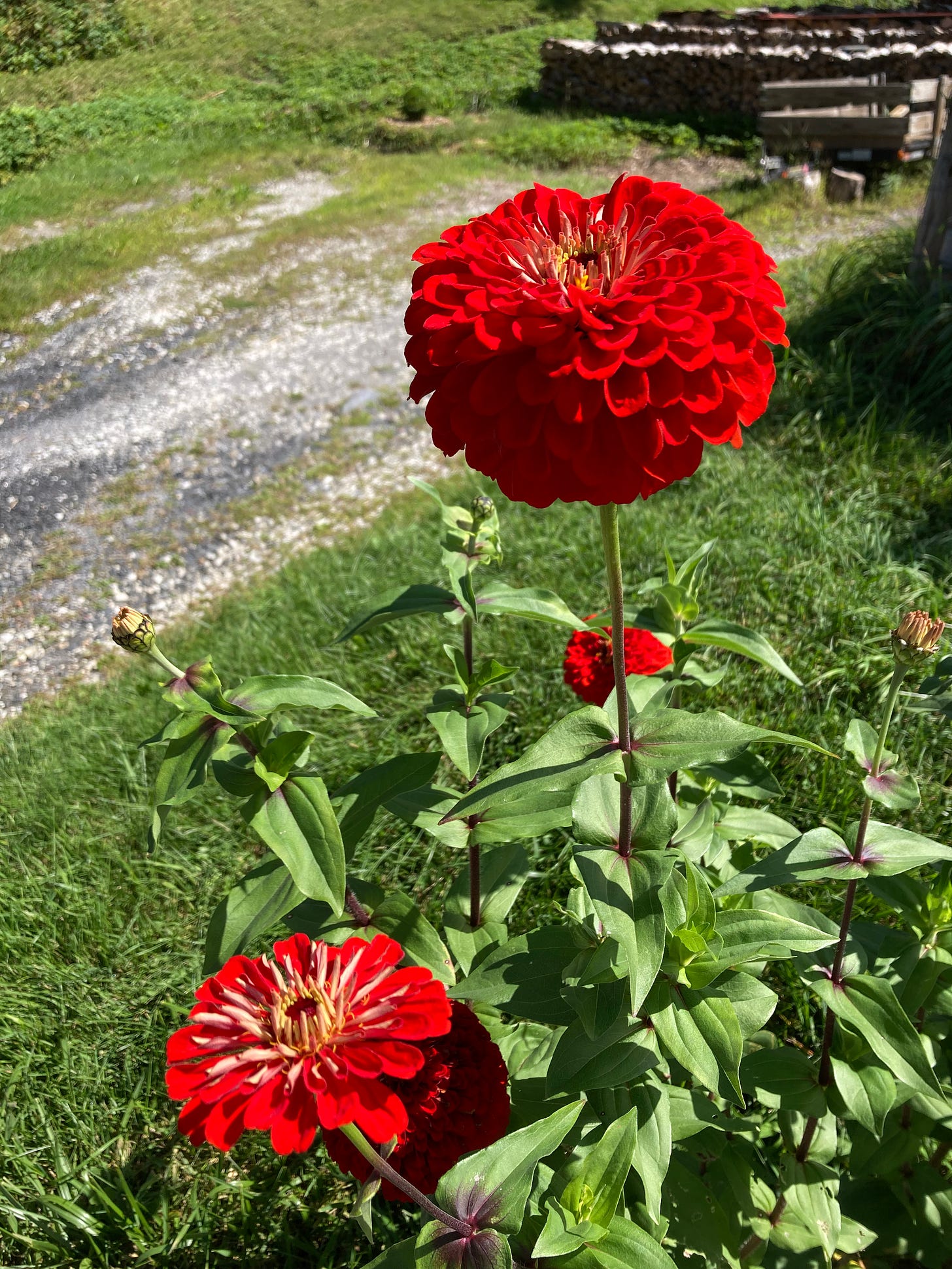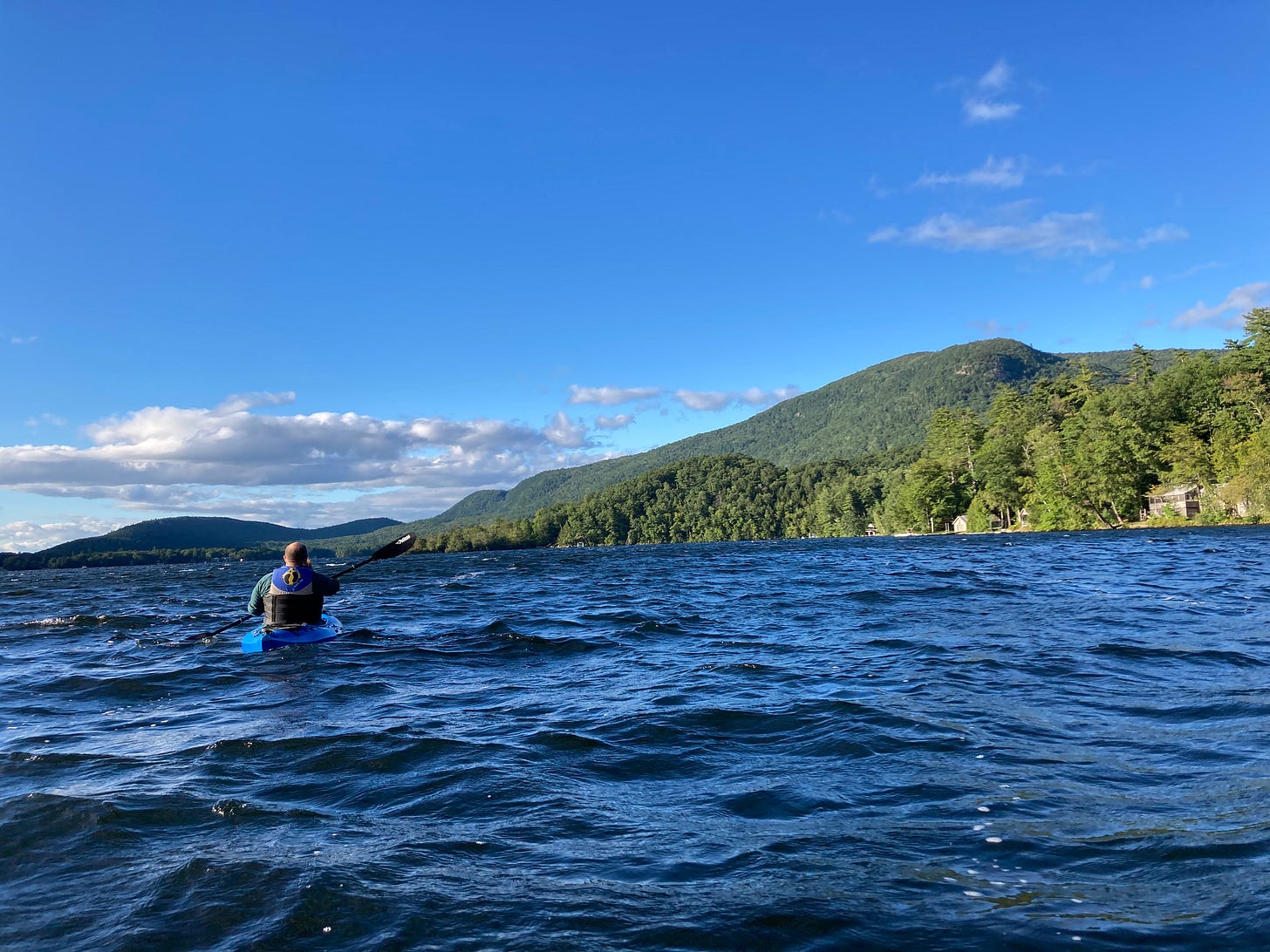Making the Most of It
What does it mean to "make the most" of your time - and should that even be the goal?
It is Labor Day, and I’ve chosen to spend one last afternoon with my parents at the lake. We’ve already been back to school and work for a week, but my parents are lingering on the East Coast, hosting a string of family and friends, before heading back to the Midwest and the drudgeries of “real life.” The weather is not ideal: cold, cloudy, and windy enough to produce whitecaps on our little lake. My parents went for a long hike yesterday and are inclined to take it easy today. For the moment, we are stuck inside.
I feel myself descending into a funk. I’m grumpy, and frustrated. No one wants to do anything, and we only have a few hours before we have to head home—after which I probably won’t see my parents for three months and this lake for eight. Despite my ongoing efforts to be comfortable with more and more nothing, this feels like an exception. A last chance. A moment that, if not maximized, will be considered wasted. It pains me.
“Make the most of it.”
“Cherish every moment.”
“Maximize your time.”
“Optimize!”
“Enjoy it while it lasts.”
“Carpe diem!”
These are all ways of saying that time matters. That there are good ways and bad ways to spend it. That life is short, and change is ever-present. My afternoon at the lake prompted me to ponder these adages. Are they true? Does “maximizing my time” make sense as a goal? And if so, how exactly do I do that, anyway?
Like most clichés, the concept behind these feels both true and not true. Life is certainly, on a cosmic scale, short—and unpredictably so. Change, loss, and grief are our constant companions. Gratitude, noticing, and microdoses of peace are all practices I’m trying to incorporate—practices that I believe will lead to health, contentment, and joy.
But even if all that is true, I have a sense that I am over-valuing time. It feels okay to grieve the passage of time, but less so to be plagued with guilt over how I spent it. It feels okay to be mindful of the present moment, but less so to insist that each moment be productive. Spending, productivity—even the language we use to talk about time aligns it with money, posits it as capitalist currency. So how to walk the line?
In my lake scenario, the primary concern was my time with family, and there was a very real secondary concern of how I spent my time in my favorite place. In both cases, my impulse was to do—to embark on an activity, or twelve—not to be. But when you only have a few hours, being just doesn’t feel like enough. Perhaps it’s because this situation is unnatural: we’re just not meant to live far apart from our people, our tribe, or the places where we feel most connected to the earth and the divine. If we were with them all the time, it would be easier to just be. When you’re married to someone for a decade, it’s okay to eat a meal without talking, to read silently, together, on opposite couches, or to text a two-word check-in.
I pride myself on having friends who live thousands of miles away but with whom I can pick up, right where I left off, after months or even years apart. Our closeness doesn’t seem to diminish with the passage of time, or to rely on the duration of a visit.
There is a magic to this—a connection that withstands life’s shifting sands—but I don’t think it’s all magic.
I’m envisioning something a bit like Quality Time from the 5 Love Languages…but I do not endorse Gary Chapman, and many of his theories have been debunked. Other ideas I’ve gleaned from are Glennon Doyle’s “kairos time” and The Fox and the Foxhound’s “patronus moments,” but those aren’t self-explanatory. I could go with “time well-lived”—but heck, let’s keep it brand-aligned and call it Utterly Alive Time. So, in an effort to unpack the alchemy of what makes for a fulfilling moment in community, I’ve assembled what I see as a few essential ingredients.
Devon’s Recipe for Utterly Alive Time
The substrate. I’m envisioning an interaction in which:
You’re gathering in person
Your time together feels limited
There are things you don’t know about each other. A lot has happened in the interval since you last connected deeply. You’ve changed.
Ingredient #1: Open expectations
I’ll be honest: this ingredient was an afterthought. But being prescriptive is dangerous, and I think adding this piece allays some of that danger. When you get together with someone who you haven’t seen in awhile, or go with others to a favorite place—and this may seem awkward or radical—try talking to the others about what they hope to take away from your time together. This is me, sheepishly disclosing to one or two friends on our group vacation that I wanted to process our grief together. If I hadn’t said anything, no one would have known that I wanted it to happen, and yet I would have been disappointed if it hadn’t.
But it could be something smaller: I want to go for a paddle, I want to go to our favorite bakery, I want to talk about parenting, I want an extra long hug. It could also be an expression of what you don’t need: I don’t need to go deep on our family drama, I don’t want to talk about my divorce, I don’t need a fancy meal, I don’t want to leave this porch. The key here is identifying what will make you feel more whole—will fill your love tank (noting again that Gary Chapman and his book are highly problematic, but this concept makes sense)—and then expressing that out loud to the folks you’re with.
Now you’ve entered a choose-your-own-adventure. If one or both of you needs to go deep in order to fill that love tank, proceed to Ingredient #2. If not, you can skip to #3.
Ingredient #2: Vulnerability
At least nine times out of ten, this is what I need. Everyone is not me. But the catch-22 of being an introvert is that we crave intimacy and yet have a deep fear of initiation. I’ve realized, though, that if I’m the one who wants it to happen, then I need to be the one to initiate it. So I’ve been brainstorming some tips and shortcuts, and I’d love to hear your ideas, too.
First, what do I mean by vulnerability? I’ll use Brené Brown’s definition, which is: “uncertainty, risk, and emotional exposure.” It’s going out of our comfort zone, letting down the walls, taking off our masks. It’s acknowledging that we’ve changed, or that we’re struggling, or that life’s not perfect, or that we feel alone. It’s a lot easier said than done.
I also want to acknowledge that vulnerability is a privilege and that our ability to access it can be affected by racism, sexism, classism, homophobia and trauma history. Suffice it to say that, though I don’t address it in detail here, I believe in fighting for a world in which vulnerability is available to everyone.
Here are a few ideas I’ve come up with to help initiate vulnerability when time is short:
Know what works to break your own walls down and help you let go of control. Do you require sweat or adrenaline? Cozy comfort? To be surrounded by nature? To be 1:1, without spouses or children? How can you foster these conditions—and if not, do you need to adjust your expectations?
Brainstorm a couple of questions ahead of time that you want to ask the other person. This way, you can focus on opening the window for conversation, not what to do when it opens.
If sitting face to face and diving right in feels intimidating, come up with an activity that allows you to be side by side and slightly occupied. This could be taking a walk, going for a drive, chopping vegetables, pushing kids on the swings. Ideally, you are close enough to talk, but the activity diffuses some of the intensity.
Use an ice breaker deck. I’ve never really done this, though I’ve eyed Esther Perel’s version. Has anyone had success with this approach?
Ingredient #3: Glue
Whether or not you’re going deep this time, if you want to feel closer, you need what I’m calling “glue.” If vulnerability is about acknowledging what has changed, or what makes you feel alone, then glue is about acknowledging what’s still the same—what makes you you, and us us. It’s all about reinforcing the bond. Here are some examples:
Do something you both like doing. It could be a sport, a game, a food, a show, a place. It could also just be sitting in silence. Any activity, big or small. If the activity allows you to chat, this pairs very well with the side-by-side approach to vulnerability, but they don’t have to be one and the same.
Revive a tradition or memory. Introduce a song, or a food, or an inside joke that recalls a time when you felt close in the past. Add an updated twist if you like. You might also look at old pictures together or retell old stories.
The concoction.
The point of all this, again, is to find that fine line between “making the most of” a situation and stressing out about wasted time and lost opportunities. Imperfection is important. Think toward Utterly Alive Time.
For me, Utterly Alive Time is saturated with a sense of love, connection, and belonging. I do think that clearer expectations + more vulnerability + more glue = more Utterly Alive Time. But I know there are no perfect ratios, and that they will differ from person to person. And for some of us, even Utterly Alive isn’t quite enough; we’ll always be left hungry for more. This recipe is not backed by empirical data, and it hasn’t been fully tested. Proceed with caution.
The tagline for Toward Utter Aliveness is “creatively conspiring for divine, embodied community.” We can’t have that kind of community all the time, and all time can’t be Utterly Alive Time. Down time and drudgery are sacred in their own way. But I do believe that when we shed our masks and allow for vulnerability, we make room for the divine to enter. So yes, there is a magic piece to it after all.
We are driving away from the lake. The clock has run out. I feel all mixed up inside.
On the one hand, a few things happened that felt good, that filled me up: we walked in the woods, we played a few rounds of Uno, Jr. together, I went for a very brief paddle in the whitecaps, and I prepped dinner with my dad.
What would have taken it up a notch—made me feel utterly alive, though?
In a revised scenario, I ask my mom about her health as we walk in the woods. I share my fears, my grief. We listen to a playlist of family favorites as we play Uno, Jr. We crack open an old photo album. I say something honest with my dad as we are chopping vegetables, and he confesses what’s on his mind. When the sun starts to set, we stop what we’re doing, in spite of the clock, and the cold, and we go down to the dock for our traditional toast.
Next time. 🤞
With light, life, and love,
Devon
P.S. Just one more week to sign up for the fall session of Tend: Embodied Community for M/others! I posted the topics we’ll be covering and some FAQs on Instagram, so check those out. Paid subscribers and their referrals get 10% off this offering. The discount code is at the bottom of this message, behind the paywall. We start September 12th!
DISCOUNT CODE for paid subscribers to Toward Utter Aliveness and their referrals for the fall session of Tend: Embodied Community for M/others is TUAFRIENDS10. Enter it as a promotion code at the link below to save 10%.





